Augsburg Fortress Lutheran Studies Collection (6 vols.)
Digital Logos Edition
Overview
The Augsburg Fortress Lutheran Studies Collection contains six volumes on Martin Luther’s theology, with contributions from various disciplines. The collection analyzes Luther’s relationship with philosophy, including his philosophical formation, influence on major philosophers, and impact on twenty-first-century philosophy. It examines the Lutheran Confessions in their political, social, ecclesiastical, and theological contexts and studies Luther’s relationship with Jews and Judaism. The collection includes Philip Jacob Spener’s famous Pia Desideria, a response to the shortcomings in the Reformation, in which he presents a new system of Christian living among civil authorities, clergy, and common people in keeping with Luther’s Reformation motives. It also includes Luther’s Treatise on Good Works, with an introduction by Scott Hendrix on the Good Works dilemma, in which justification by faith alone has—and was—been misunderstood and misrepresented. The Augsburg Fortress Lutheran Studies Collection puts Luther’s thought in a twenty-first-century context and illustrates its contemporary relevance.
The Augsburg Fortress Lutheran Studies Collection is perfect if you’re a student, scholar, pastor, or layperson interested in the most pressing topics relating to Martin Luther’s theology. The Logos Bible Software edition of this collection is designed to encourage and stimulate your study and understanding of Luther. Scripture passages link directly to your English translations and original language texts, and important theological concepts link to dictionaries, encyclopedias, and a wealth of other resources in your digital library. In addition, you can perform powerful searches by topic and find what other authors, scholars, and theologians have to say about Luther’s works and theology.
Key Features
- Examines, assesses, and evaluates Luther’s theology
- Analyzes Luther’s theological impact on twenty-first century living
- Includes Philip Jacob Spener’s famous Pia Desideria and Luther’s Treatise on Good Works
Product Details
- Title: Augsburg Fortress Lutheran Studies Collection
- Publisher: Augsburg Fortress
- Volumes: 6
- Pages: 1,819
Individual Titles
- The Devil’s Whore: Reason and Philosophy in the Lutheran Tradition edited by Jennifer Hockenbery Dragseth
- The Lutheran Confessions: History and Theology of The Book of Concord edited by Charles P. Arand, Robert Kolb, and James A. Nestingen
- Martin Luther, the Bible, and the Jewish People: A Reader edited by Brooks Schramm and Kirsi I. Stjerna
- Pia Desideria by Philip Jacob Spener
- The Theology of Martin Luther: A Critical Assessment by Hans-Martin Barth
- Treatise on Good Works by Martin Luther
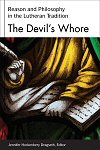
Martin Luther’s disdain for philosophy is well known, and the Lutheran theological tradition has been wary of its constructs. Yet the tradition also includes philosophical giants—from Melanchthon to Schleiermacher to Kierkegaard and even Nietzsche. This volume assumes that such skepticism about reason actually opened up new ways of doing and seeing philosophy.
Philosophers, theologians, and historians assess the paradox and achievements of philosophy in the Lutheran vein. In their important exploration in the history of ideas, they not only probe the roots and branches of Luther’s own ambivalence toward philosophy, they also draw illuminating connections between his revolutionary theology and the development of European continental philosophy.
Contributors:
- Oswald Bayer
- Dennis Bielfeldt
- Troy Dahlke
- Sarah E. Fredericks
- David J. Gouwens
- Christine Helmer
- Paul R. Hinlicky
- David M. Hockenbery
- John F. Hoffmeyer
- Denis R. Janz
- Gregory Johnson
- Pauline M. Kaurin
- Carter Lindberg
- Christian Lotz
- Mary Elise Lowe
- Martin E. Marty
- Charles Peterson
- Gregory R. Peterson
- William R. Russell
- Lea F. Schweitz
- Gary M. Simpson
- Mary J. Streufert
- David Vessey
- Markus Wriedt
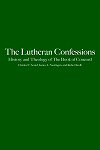
From their formulation in the sixteenth century through the present day, every generation of Lutheran leadership has grappled with the centrality and importance of the Lutheran confessional writings. In this important new volume, Arand, Kolb, and Nestingen bring the fruit of an entire generation of scholarship to bear on these documents, making it an essential and up-to-date class text. The Lutheran Confessions places the documents solidly within their political, social, ecclesiastical, and theological contexts, relating them to the world in which they took place, and assists readers in understanding the issues at stake in the narratives, both in their own time and in ours.
Confessional commitment, ecclesiastical identity, and scholarly expertise characterize this concise, yet incisive, analysis of the historical setting and theological content of the Lutheran Confessions in light of contemporary scholarship. The volume serves as a valuable companion to The Book of Concord, and it will be a welcome resource for all students of the Lutheran confessional documents, both in the parish and in an academic setting.
—Kurt K. Hendel, Bernard, Fischer, Westberg Distinguished Ministry Professor of Reformation History, Lutheran School of Theology at Chicago
In this volume, Arand, Nestingen, and Kolb, as internationally recognized premier scholars of the Lutheran Confessions, bring the harvest of the past quarter century research into the hands of readers. As they give a detailed historical account of the fascinating stories behind The Book of Concord with their own theological insight, readers will be drawn not only into the content but even more importantly into the mind of the Confessions and the way in which they taught and confessed Jesus Christ. The Lutheran Confessions: History and Theology of the Book of Concord will make a remarkable and lasting contribution to a new generation of students, scholars, and pastors, and assist them in confessing Christ in the twenty-first century America and the world.
—Naomichi Masaki, associate professor of systematic theology, Concordia Theological Seminary
Charles P. Arand is a professor of systematic theology at Concordia Seminary in St. Louis, Missouri. His recent publications include The Genius of Luther’s Theology.
Robert Kolb is Emeritus Mission Professor of Systematic Theology and director of the Institute for Mission Studies at Concordia Seminary in St. Louis, Missouri. Among his many publications are The Book of Concord and Martin Luther: Confessor of the Faith.
James A. Nestingen is emeritus professor of church history at Luther Seminary in St. Paul, Minnesota. He is a nationally recognized Luther scholar as well as a popular speaker and lecturer. Nestingen is the author of numerous books, including Martin Luther: A Life and Sources and Contexts of The Book of Concord.
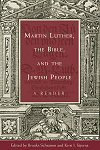
The place and significance of Martin Luther in the long history of Christian anti-Jewish polemic has been and continues to be a contested issue. It is true that Luther’s anti-Jewish rhetoric intensified toward the end of his life, but reading Luther with a careful eye toward “the Jewish question,” it becomes clear that Luther’s theological presuppositions toward Judaism and the Jewish people are a central, core component of his thought throughout his career, not just at the end. It follows then that it is impossible to understand the heart and building blocks of Luther’s theology without acknowledging the crucial role of “the Jews” in his fundamental thinking.
Luther was constrained by ideas, images, and superstitions regarding the Jews and Judaism that he inherited from medieval Christian tradition. But the engine in the development of Luther’s theological thought as it relates to the Jews is his biblical hermeneutics. Just as “the Jewish question” is a central, core component of his thought, so biblical interpretation (and especially Old Testament interpretation) is the primary arena in which fundamental claims about the Jews and Judaism are formulated and developed.
Written by two distinguished Lutheran scholars, one an expert on the Hebrew Bible, the other an authority on the Reformation, this volume makes an invaluable contribution to our understanding of a central—yet little understood—dimension of Luther’s writings: the place of Jews and Judaism in the Reformer’s thought. Quickly dismantling the accepted but false notion that this aspect of Luther was important to him only at the end of his life, Schramm and Stjerna prove that it was in fact an abiding theme in his writings. The texts they choose to translate and introduce demonstrate that this concern was one, in fact, that pervaded the entirety of his career. Beautifully contextualized socially and theologically, these documents are also expertly translated from the Latin and German. This superb and timely collection of texts will be of interest not only to Luther and Reformation specialists and teachers but to historians of Jewish-Christian relations and of the history of interpretation of the Bible.
—Kevin Madigan, Winn Professor of Ecclesiastical History, Harvard Divinity School
With great precision and clarity, this reader re-opens and decisively advances the discussion of Luther’s relationship to the Jews. Indispensable for all future study of this vexed question.
—Denis R. Janz, provost distinguished professor of the history of Christianity, Loyola University
Brooks Schramm is a professor of biblical studies at Lutheran Theological Seminary at Gettysburg. He is the author of The Opponents of Third Isaiah and with Kirsi Stjerna, Spirituality: Toward a Twenty-First Century Understanding.
Kirsi I. Stjerna is a professor of Reformation church history and the director of the Institute for Luther Studies at Lutheran Theological Seminary at Gettysburg. She is the author of No Greater Jewel: Luther on Baptism and Women and the Reformation.
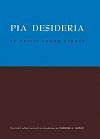
This classic work, first published in 1675, inaugurated the movement in Germany called Pietism. In it, a young pastor, born and raised during the devastating Thirty Years War, voiced a plea for reform of the church which made the author and his proposals famous. A lifelong friend of the philosopher Leibnitz, Spener was an important influence in the life of the next leader of German Pietism, August Herman Francke. He was also a sponsor at the baptism of Nicholas Zinzendorf, founder of the Moravian Church, whose members played a crucial role in the life of John Wesley.
It is hard to believe that the English-reading world has had to wait 289 years to have an English translation of the most important document of German Pietism! . . . Consisting of three parts, a brief review of ‘corrupt conditions’ prevailing in the evangelical church; a presentation of the possibility of church renewal; and six specific proposals for the renewal of the church . . . Pia Desideria is relevant to contemporary yearnings and efforts, not because its program should be borrowed in toto, but because it witnesses to the recurring need for and possibility of God’s renewal of his people.
—Review and Expositor
Philip Jacob Spener (1635–1705), the “Father of Pietism,” was a German theologian. He was the pastor in the Lutheran Church at Frankfurt and authored numerous works, including Allgemeine Gottesgelehrtheit.
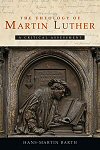
The Theology of Martin Luther: A Critical Assessment
- Author: Hans-Martin Barth
- Translator: Linda M. Maloney
- Publisher: Augsburg Fortress
- Publication Date: 2012
- Pages: 600
Does Martin Luther have anything to say to us today? Nearly five hundred years after the beginning of the Reformation, Hans-Martin Barth explores that question in this comprehensive and critical evaluation of Luther’s theology. Rich in its extent and in its many facets, Barth’s didactically well-planned work begins with clarifications about obsolete and outdated images of Luther that could obstruct access to the Reformer.
The second part covers the whole of Martin Luther’s theology. Having divided Luther’s theology into twelve subsections, Barth ends each one of these with an honest and frank assessment of what today can be salvaged and what’s got to go. In the final section he gives his summation: an honestly critical appropriation of Luther’s theology can still be existentially inspiring and globally relevant for the twenty-first century.
Like a scalpel, Hans-Martin Barth’s The Theology of Martin Luther exposes, analyzes, and evaluates the unique body of Luther’s theology. It provides, like never before, criteria for a realistic celebration of five centuries of Luther research (1517–2017).
—Eric W. Gritsch, lecturer, Lutheran Theological Seminary at Gettysburg
Barth’s forthrightly critical but passionately appreciative reading of Luther in the context of the late-twentieth and early-twenty-first centuries models how we may fruitfully engage Luther’s discerning, perceptive reading of Scripture and sensitivity to the human struggle in ways that speak to the people of our time, who live in a vastly different world than his.
—Robert Kolb, Emeritus Mission Professor of Systematic Theology, Concordia Seminary
This magnificent study offers an honest and compassionately critical account of Martin Luther’s ‘provocative theology of existence’ with its tensions and integrative possibilities for future generations. Hans-Martin Barth is bringing Luther back to the ecumenical center, especially with the reformer’s Trinitarian foundations, and invites the readers to contemplate on what of Luther may endure for the future, and to whom. An indispensable companion for teachers and students alike, now available in an engaging English translation.
—Kirsi Stjerna, professor of Reformation church history Lutheran Theological Seminary at Gettysburg
Hans-Martin Barth is an emeritus professor of systematic theology and philosophy of religion, Philipps-University Marburg, Germany, and a former president of the Evangelical Alliance. He is the author of many works including Dogmatic: Protestant Faith in the Context of World Religions, 3rd edition and Authentic Feel: Impetus to a New Self-Understanding of Christianity.
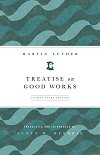
Luther’s transformational idea of justification by faith alone was often misunderstood and misrepresented in the early years of the Reformation. In 1520, with his Wittenberg congregation in mind, Luther set out to clarify the biblical foundation of good works. In doing so he recast the very definitions of “sacred” and “secular” both for his own generation and ours.
With his extensive grasp of Luther’s thought and time, Hendrix offers readers his insights into the ways the Wittenberg reformer addressed some of the most vital elements of Luther’s critical pamphlet, a part of his programatic call for reform of 1520. An introduction which places this work in theological and historical context, along with helpful notes, guides readers through the sensitive and nuanced translation. Treatise on Good Works is ideal for use in college or seminary classrooms and in congregational study groups.
—Robert Kolb, Emeritus Mission Professor of Systematic Theology, Concordia Seminary
Martin Luther stands as one of the most significant figures in Western history. His distinction as the father of the Protestant Reformation is augmented by his innovative use of new technology (the printing press), his translation of the Christian Bible into the vernacular, and his impact upon European society. Born in 1483 to middle-class parents in Saxony, eastern Germany, he became an Augustinian monk, a priest, a professor of biblical literature, a reformer, a husband, and father. He died in 1546 after having witnessed the birth of a renewal movement that would result in a profound shift in faith, politics, and society. He has been both praised and vilified for what he preached and wrote. His thought continues to influence all Christians and to animate the movement that bears his name.
Scott H. Hendrix is an emeritus professor of Reformation history and theology at Princeton Theological Seminary. He earned a PhD in Reformation studies from Tübingen University in Germany, and has chaired the Continuation Committee of the International Congress for Luther Research. Among his many publications are Luther and Martin Luther: A Very Short Introduction.
Reviews
3 ratings

Rev. Robert Sundquist
9/20/2018

Ralph A. Abernethy III
9/7/2017


Charles Puskas
4/19/2015